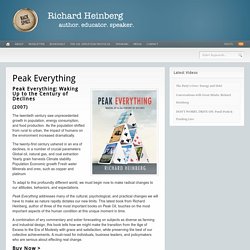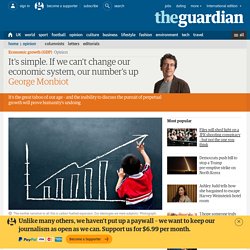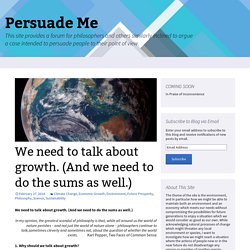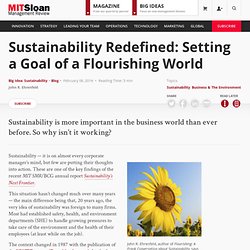

What is a smart home anyway? Richard Heinberg. Peak Everything: Waking Up to the Century of Declines The twentieth century saw unprecedented growth in population, energy consumption, and food production.

As the population shifted from rural to urban, the impact of humans on the environment increased dramatically. The twenty-first century ushered in an era of declines, in a number of crucial parameters: Global oil, natural gas, and coal extraction Yearly grain harvests Climate stability Population Economic growth Fresh water Minerals and ores, such as copper and platinum To adapt to this profoundly different world, we must begin now to make radical changes to our attitudes, behaviors, and expectations. CCA Exhibition - 1973: Sorry, out of gas. Time to Wake Up: Days of Abundant Resources and Falling Prices Are Over Forever. Introduction The purpose of this, my second (and much longer) piece on resource limitations, is to persuade investors with an interest in the long term to change their whole frame of reference: to recognize that we now live in a different, more constrained, world in which prices of raw materials will rise and shortages will be common.
(Previously, I had promised to update you when we had new data. Well, after a lot of grinding, this is our first comprehensive look at some of this data.) Accelerated demand from developing countries, especially China, has caused an unprecedented shift in the price structure of resources: after 100 hundred years or more of price declines, they are now rising, and in the last 8 years have undone, remarkably, the effects of the last 100-year decline! It's simple. If we can't change our economic system, our number's up. Let us imagine that in 3030BC the total possessions of the people of Egypt filled one cubic metre.

Let us propose that these possessions grew by 4.5% a year. How big would that stash have been by the Battle of Actium in 30BC? This is the calculation performed by the investment banker Jeremy Grantham. Go on, take a guess. Ten times the size of the pyramids? To succeed is to destroy ourselves. Economic growth is an artefact of the use of fossil fuels. It was neither capitalism nor communism that made possible the progress and pathologies (total war, the unprecedented concentration of global wealth, planetary destruction) of the modern age. On Friday, a few days after scientists announced that the collapse of the west Antarctic ice sheet is now inevitable, the Ecuadorean government decided to allow oil drilling in the heart of the Yasuni national park. The 5 Greenest Countries On Earth (And All Of The Rest), Ranked. Switzerland does a good job managing the environment and protecting human health.

The United States does it middlingly well. And Somalia, Haiti, and Afghanistan--as you might expect--not so great. They are some of the worst performers in a new ranking of environmental performance. The Environmental Performance Index (EPI) assesses countries for how well they protect people from environmental harm and how well they protect ecosystems from human encroachment. It crunches data for nine categories--from air quality to forest and marine health--using 20 indicators in all. New York's new mayor must build on Michael Bloomberg's green legacy. During his 12 years as mayor of New York city, billionaire businessman Michael Bloomberg has had an indelible effect on America's largest metropolis.

As his tenure comes to a close, both the media and New Yorkers are analysing his legacy, from his aggressive reform of the school system to his controversial stop-and-frisk police policy. Rarely mentioned, however, is Bloomberg's dogged effort to make New York a sustainable city by reducing its greenhouse gas emissions and protecting its 8.4 million residents from the perils of climate change. Bloomberg's sustainability push began quietly in 2005 when demographers projected that New York City would grow by 1 million people by 2030. His staff immediately started searching for ways to fit the extra residents into an already cramped and overstrained city. The solution, they eventually realised, was sustainability.
PlaNYC suffered some big setbacks in its first few years. Scientists warned the risk would only worsen in the coming decades. Shoring Up Embankments Not Only Sustains The Environment, But Can Actually Save Energy. CO2 Emissions Published on December 9th, 2013 | by David L Roberts Imagine the embankments along highways, reinforced hillsides at commercial and industrial sites, and levees that support waterways.

What you see – and especially what you cannot see behind the walls — is construction material primarily made of concrete, steel, and even polymers. The legacy engineering and technologies for earth management have been around for decades. And the materials employed in the market today for these projects require great amounts of energy to manufacture, ship, and install. However, today’s business environment requires companies be seen as responsible citizens by demonstrating practices of sustainability, minimizing greenhouse gas (GHG) emissions, and saving energy. Recycled tires cut and shaped to reinforce retaining wall. ArmaTerra GeoReinforcing (ATG) Tensar Reinforced Earth Company Other leading MSE companies – none claim energy efficiency in their product line. We need to talk about growth. (And we need to do the sums as well.) - Persuade Me. We need to talk about growth.

Sustainability Redefined: Setting a Goal of a Flourishing World. Sustainability is more important in the business world than ever before.

So why isn’t it working? Sustainability — it is on almost every corporate manager’s mind, but few are putting their thoughts into action.